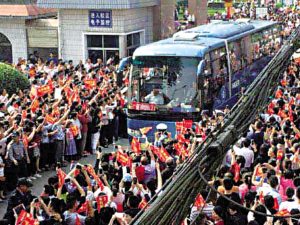Xinyan Zhang’s high school was in Beijing, and she got a score of 550 out of 710 in her gaokao, which is China’s National Higher Education Entrance Examination. She chose the Communication University of China, one of the top universities in China.
Because Zhang wanted to major in Broadcast Journalism, she took the arts exams with other applicants and ranked 71. When entering her college, Zhang felt very confident about her scores until she met three classmates from Jiangsu, ranking from 1-3 on the art exams.
Zhang would never forget the conversation between her and her Jiangsu classmates. Zhang’s classmates said it was impossible for them to come to the Communication University of China if their Arts exam rankings were not high.
This conclusion may all come from the different education policies made by the Chinese government based on the hukou system.
In China, the hukou system is a system of household registration, which identifies a person’s information including residence, name, parents, spouse and date of birth.
The government has dominated the gaokao examination, which is considered a fair game for each student. Especially in Beijing, the government don’t need many migrants and wants to make the scores of policymakers’ children look nicer.
Students usually go to their schools near their hukou, and they are required to take gaokao in their hukou location.
According to the local education bureau offices data, Beijing students like Zhang have a 25 percent chance to get into one of the government-identified top universities. However, Jiangsu students have a less than 10 percent chance to get into such universities.
China’s prestigious Peking University and Tsinghua University, which are both located in Beijing, take 84 students out of every 10,000 Beijingers, 14 out of every 10,000 Tianjiners (a city near Beijing), and only 2 out of every 10,000 Jiangsuers.
This condition has happened not only on Jiangsu students, but also students from Hunan, Hefei, Anhui, etc.
Zhang reminded her high school president talking about how the high school alumni met each other in Peking University and Tsinghua University. Each year, at least 100 students at her school have the chance to go to the two universities. In the entire Jiangsu province, less than 15 students may have the same opportunity, although the population of Jiangsu is 3.5 times larger than Beijing’s.
More importantly, the education quality and even the pressure on students are higher in Jiangsu. Because students have to take their province’s gaokao examinations during the same three-day gaokao period, the difficulty levels are different.
Students joked on Weibo, the Chinese Twitter, that Beijing’s gaokao is the easy mode, Tianjin’s is the medium mode, and Jiangsu’s is the hell mode.
Zhang said one of her classmates from Jiangsu always felt not confident even though she always had the best scores in class and got accepted by one of the top newsrooms in China.
Zhang also called herself a confident girl because she believed that students in Beijing had experienced the ‘encouraged education system.’
As the province that has the highest per capita GDP in China, Jiangsu’s total GDP was 7.06 trillion yuan in 2017. Therefore, some wealthy parents come with two ways to help their children overcome the education disadvantage.
Middle- or high-class parents ask their children to study English and send them to study abroad after graduation. Therefore, these students don’t have to tolerate the unfair competition with Beijing’s students.
On the other hand, more parents are coming up with new methods. In 2017, The China Daily reported on how did some Chinese parents purchase the Republic of Guinea’s citizenship for their children. Therefore, these local students became foreigners, took the easiest gaokao examinations designed for international students, and finally got into Peking University.
Sources:
https://www.businessinsider.com/maotanchang-gaokao-factory-town-2013-10
https://www.theatlantic.com/china/archive/2013/06/chinas-unfair-college-admissions-system/276995/

Leave a Reply
You must be logged in to post a comment.